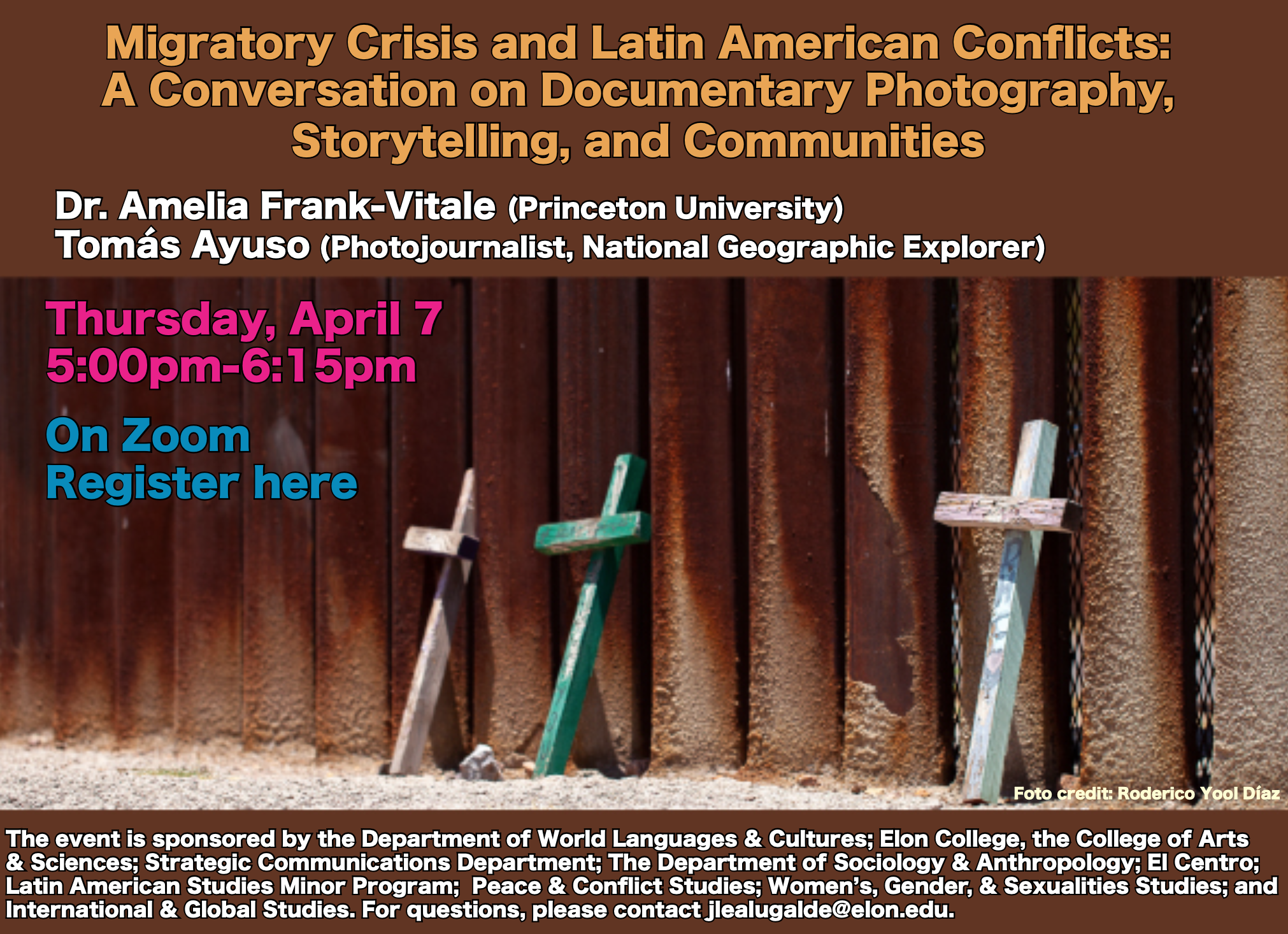https://eloncdn.blob.core.windows.net/eu3/sites/74/2022/04/Screen-Shot-2022-04-13-at-4.25.29-PM.png
Photographers Thomas Ayuso and Amelia Frank Vitale from Princeton University hosted a virtual event on the contemporary migration crisis from Central America and Mexico to the United States.
 Elon University hosted Thomas Ayuso, National Geographic photographer, and Amelia Frank Vitale, postdoctoral researcher and lecturer in Latin American Studies at Princeton University, on Thursday, April 7 for a virtual conversation about documentary photography, storytelling and communities.
Elon University hosted Thomas Ayuso, National Geographic photographer, and Amelia Frank Vitale, postdoctoral researcher and lecturer in Latin American Studies at Princeton University, on Thursday, April 7 for a virtual conversation about documentary photography, storytelling and communities.
In this case, they explored the migration crisis and ongoing violent conflicts in Latin America, urging a critical re-examination of the human rights situation in the region and the roots of forced displacement. Both speakers have a recognized path in documenting contemporary conflicts and promoting welfare policies for affected communities.
From extreme poverty to drug wars, people remain underrepresented without protection from their countries of origin and seek migration routes to survive. Frank Vital has shared her experiences with Central Americans, explaining that the main reasons for immigration to the United States are not only economic, but security concerns due to the presence of gangs in some marginalized communities.
Her work focused on those communities, specifically in the city of San Pedro de Sula, Honduras. She also explained how her activism and solidarity led her to participate in the migrant caravans that have aroused international interest in recent years. In one of these caravans, in Tijuana, I met Ayuso, who held an ongoing collaboration regarding activism and work with immigrant communities.
During the conversation, Ayuso explained the importance of images in communicating immigration issues to a large population. He noted how social media can be used to capture the attention of simple situations in a global context, as happened with underrepresented societies in Honduras.
Ayuso also shared his experience living with Mexican cartels and the guerrilla army in Colombia, explaining how these challenging contexts affected his career as a photojournalist by providing a deeper understanding of Latin American struggles. Create a pathway to discuss the role of photographic documentation and storytelling in dealing with these conflicts.
By constantly posting his photos on several free online access platforms, Ayuso Photos have also enhanced knowledge about his native Honduras. His work seeks to avoid forgetting the humanitarian crisis afflicting the Central American country.
His democratic approach to photography makes a global impact by sharing stories that are not commonly represented by mainstream media, according to Frank Vitale.
The event was complemented by a presentation by the former Director of the North Carolina-based Witness for Peace Southeast (WFPSE), Emily Ryan. The presentation covered the experience of the WFPSE delegation with Ilhan Omar and three other representatives from the US Congress in Honduras last March. Ryan also shared information regarding opportunities to participate in community service with local organizations.
The Virtual Conversation was sponsored by the Department of World Languages and Cultures, Elon College, College of Arts and Sciences, Department of Strategic Communications, Department of Sociology and Anthropology, El Centro, Latin American Studies, Peace and Conflict Studies, International and Global Studies, Women's and Gender Studies subprogramme.
#Photography

Comments
Post a Comment